Departments
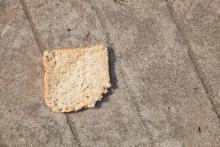
the young rabbi, earnest and intense,
forgot to read your requested scripture passage
then, a shovel had to be asked for,
so each of us could cover you
with three mounds of warm earth
your daughter fussed a little but later went for shiva at the house
the sermon was almost too simple:
the greatest good deed is to bury the dead

AS A NATIVE KOREAN who has studied and taught in the U.S. for more than 13 years, I feel like I’m always swinging between two lands—neither giving me a sense of home. Nostalgia might be too gentle a word to describe this in-between space. Rather, it’s a bitter and unpleasant reality constantly reminding me that to some I appear “strange,” “irregular,” “awkward,” “unskillful,” or “suspicious.” In this situation, I remain “unnatural.”
I often feel the same way in the church. My ethnicity and gender are considered marks of “otherness”—even in my own denomination. Every waking moment I wrestle with this question: How can I incorporate my body, my culture, my language as a Korean woman theologian fully into the body of Christ? This wrestling, while uncomfortable, also prevents me from settling with easy or convenient answers. Perpetual dislocation leads me to pay attention to the unseen and unheard corners of the world. It demands I examine old convictions and construct a creative space for new ways of thinking about God, life, and the nature of justice and hope.
The majority of our biblical stories come from people who were also living outside their own land. They too were in some way dislocated. The biblical texts this month call particular attention to their emotions, tensions, and challenges. They invite all of us to feel lost with them, to tremble with them, and to be courageous with them.

The first time we visited my sister in her monastery
Was just after one of our sons had survived massive
Surgeries, before and during which all the monks &
Nuns in the monastery, not to mention thousands of
Other generous souls, had prayed constantly for him
And it turned out that they had gone over the million
Prayer mark for our son, which, according to the law
Of the monastery, gave him lifetime privileges. He’s
No dolt, this kid, and he took off running, to hammer
On drums, and eat the cookies on an altar, and pursue
The grim local peacocks, who were deeply aggrieved.
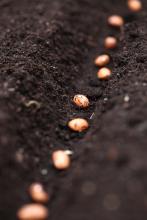
THE CHILDHOOD UNDERSTANDING of the familiar tune about climbing Jacob’s ladder needs a reset. The Genesis narratives aren’t just about heaven—they yield epiphanies into the ordinary life of faith. The household of Abraham and Sarah, even in its ancient context, is atypical. In family dynamics, without the miraculous moments, epiphanies subvert our expectations of whom and what God can utilize to reveal the faithfulness of divine promises. Sometimes the testimony is evident in ordinary lives—even ours. You’ve heard it said, “Our greatest weakness is our strength.” The episodes in Jacob’s life provide sufficient demonstrations of how passions both energize and blind us: Passion or anger; leadership or arrogance; emotion or intuition; determination or stubbornness.
Despite Jacob’s inconsistencies, the second half of Genesis encompasses his story, as the son of Isaac, grandson of Abraham. Here we find an unfolding drama. Characters display human nature at its extremes: conniving relatives, loving couples; creative entrepreneurs, dishonest contractors. All, somehow, used by God to form a people with whom the Spirit so evidently abides.
Even when we go our own way, God’s purposes are not thwarted. The challenge for the church in this Pentecost season is to trust that God is planting seeds in good soil—and the seeds that won’t sprout also have a purpose in this garden. Remember that the actions of justice, grace, and faithfulness we practice at home are as much a witness to God as our public proclamations and protests.
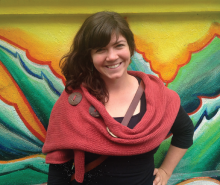
Bio:
Katerina Friesen is studying theology and peace studies at Anabaptist Mennonite Biblical Seminary in Elkhart, Ind.
1. How would you describe your current vocational role?
I see my role as both revaluing what has been cast down and degraded and building resilient communities. So far this has taken shape through land-based ministries of farming and community gardening, inviting people to work together and celebrate the sacramental in soil, food, and one another.
2. You spent several years with the Abundant Table Farm Project in Santa Paula, Calif. Can you describe the project and your role there?
The Abundant Table Farm Project is a working farm and young adult internship program that has evolved into a Christian community. I joined the project in 2009 and lived in community with four other women. My daily work of farming gave me a bodily understanding of farm workers’ labor and the need for justice and wholeness in our incredibly disconnected food system.
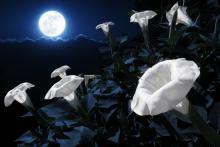
On the monastery walk,
in the clear daylight after
the night of heavy rain,
I consider the moonflower:
how the big spent blooms look like
three linen tea towels rinsed and wrung out,
three yellowed towels someone meant to
pin to the line to dry.
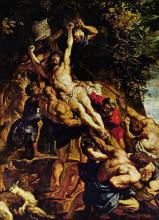
The back-lit morning wave
Clarified emerald suddenly in olive,
Then gone; forever the cry of the Christ's torso
In Rubens' "Elevation of the Cross";
A glass pepper shaker filled to overflowing
By a finger of fallen sun at the close
Of a most mundane afternoon.
Obsessed is perhaps too strong a wod